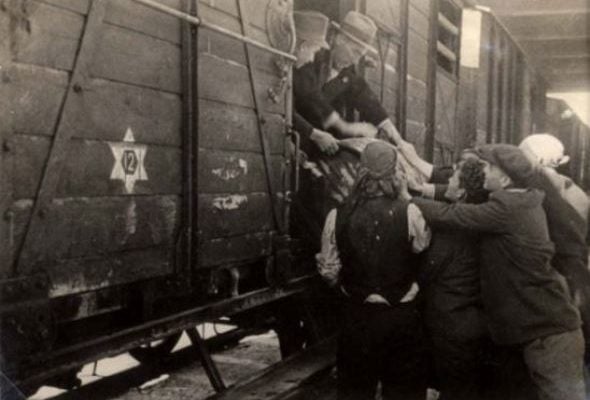Scholarly book is both a work of history and a warning that such a genocide could indeed happen again.
By Batya Jerenberg, World Israel News
A new scholarly oeuvre argues that the Holocaust was a pan-European effort, not only a German initiative, with mass killings of Jews taking place even in areas beyond the Third Reich and its satellite countries.
In his book The Holocaust: An Unfinished History, Professor Dan Stone, director of the Holocaust Research Institute at Royal Holloway, University of London, relies on both old and new research to prove that Adolf Hitler’s desire to wipe the Jewish people off the face of the earth was deeply ingrained on the continent and even beyond.
This manifested itself in the tens, if not hundreds, of thousands of collaborators who assisted the Nazis out of their own free will to carry out the Germans’ “Final Solution of the Jewish Problem.”
“Although the persecution of the Jews that led to the Holocaust was a German project — a point which cannot be overemphasized,” Stone writes, “it chimed with the programs of many European fascist and authoritarian regimes. Without the willing participation of so many collaborators across Europe, the Germans would have found it much harder to kill so many Jews.”
Stone cites the U.S. Holocaust Memorial Museum’s Encyclopedia Of Camps and Ghettos as an example of how other nations’ citizens even took the lead when it came to acting against Jews. The oeuvre is over 900 pages long and lists close to 700 places across the continent where Jews were forcibly held and then died either from slave labor, acts of murder, or “natural causes” such as deliberately unchecked disease and hunger. None of these locations were administered by Germans.
The worst single act of murder during World War II outside of the Nazi-run concentration and death camps, he writes, took place in a camp in Romanian-occupied Transnistria operated by Romanian gendarmes, Ukrainian auxiliaries and local militia. Most of the 54,000 inmates were burned to death in two stables or shot in a nearby ravine; thousands of others froze to death.
The Holocaust, he notes, was really a long series of local genocides, and to focus almost exclusively on the death camps, horrific as they certainly were, portrays an inaccurate history.
An example would be the recently passed laws in Poland whose upshot is to suppress knowledge of the extent to which Poles collaborated with the Germans in killing Jews during World War II.
Laying all the blame on one brutal regime allows people to store it away in a box and ignore some of its most salient lessons, which Stone says are quite applicable today.
The Nazis managed to tap into Europeans’ irrational fears and hatred of “the other” to the point that massive numbers of people, including their leaders and governments, could willingly rob, deport and even murder their neighbors and friends.
Stone insists it is of utmost importance to acknowledge how widespread the phenomenon was. “If we refuse to deal with this challenge,” he says, such horrors could happen again, as now is a time of rising nationalism and xenophobia, with a repeat of some of the past’s same political, religious and cultural factors.





